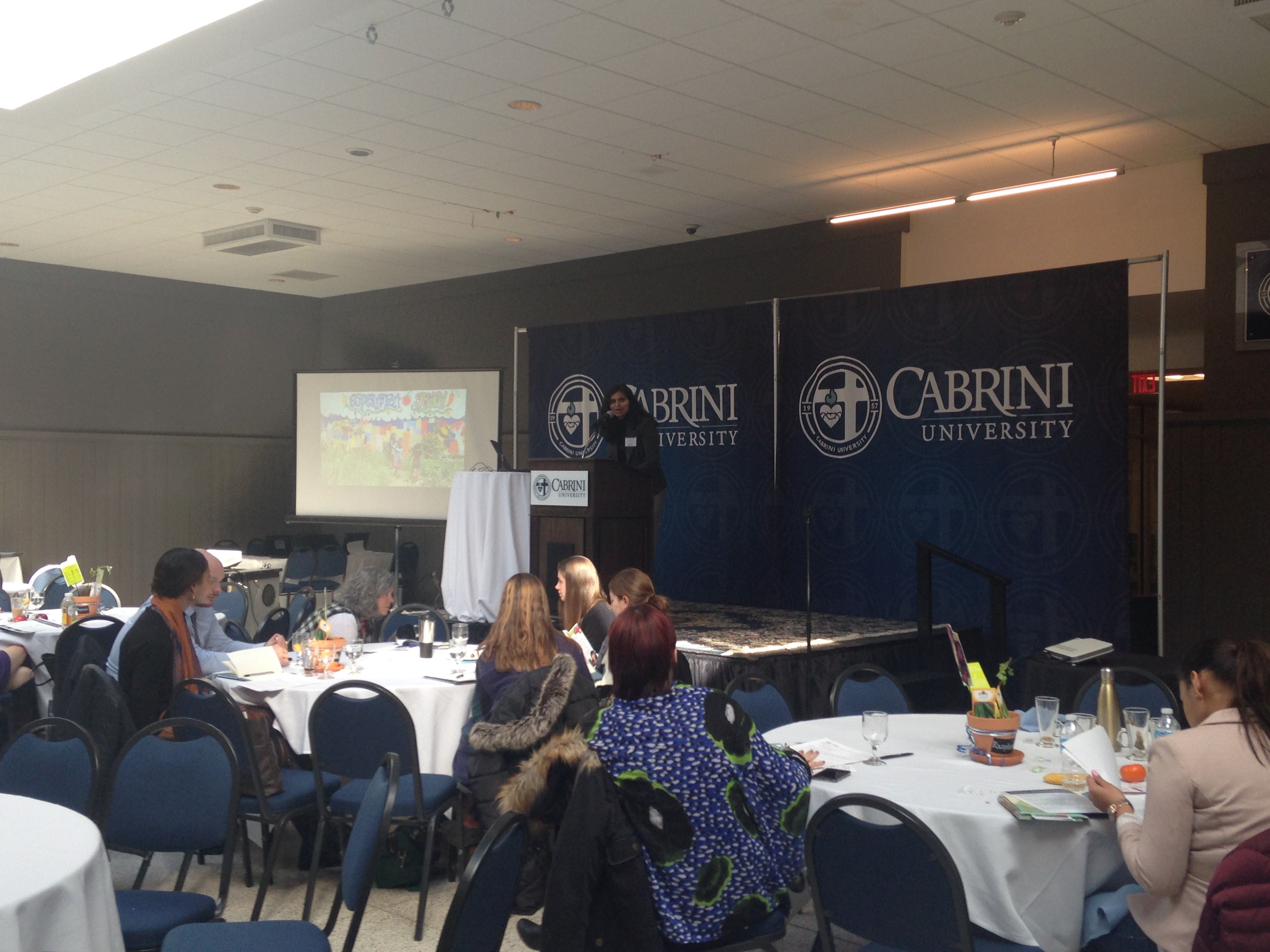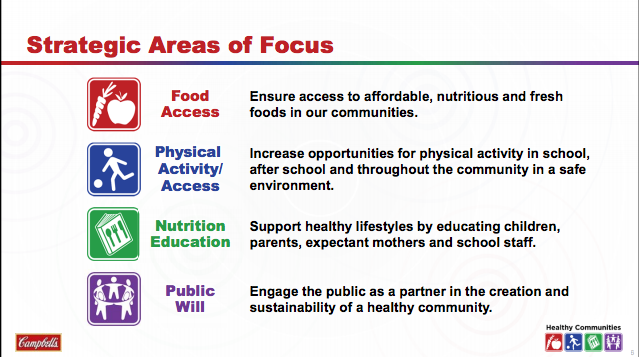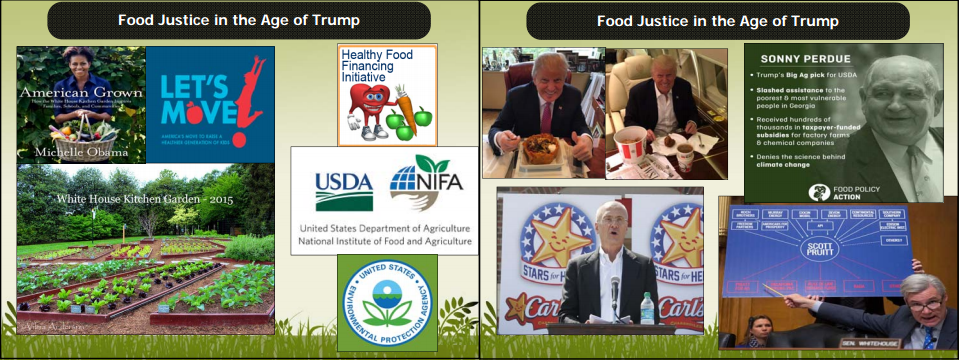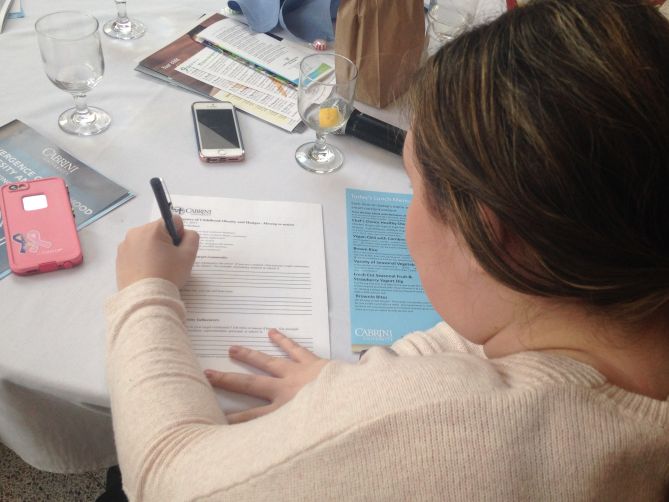
Childhood obesity and hunger are two of the leading public health issues in the nation. These topics are usually addressed separately as two different topics in a variety of organizations and by representatives.
The Convergence of Childhood Obesity and Hunger: Moving to Action symposium subverted the stigma by combining two of the topics together, treating them as equal social issues. Service providers, teachers, leaders from local organizations and students attend this symposium in the Grace Hall Atrium at Cabrini University.
The program aimed to to share the linkages between childhood obesity and hunger, to engage in collaboration in beating hunger and obesity, to set up strategies and goals within communities and to aid students in being educated on both job and educational opportunities that involve obesity and hunger.
Kim Fortunato, the president of the Campbell Soup Foundation, was one of the speakers who came to shed light on the issue of childhood obesity.

Fortunato’s main focus statement in her speech, as well as the company’s signature program “Campbell’s Healthy Communities,” is to measurably improve the health of young people in our hometown communities. An example of this took place six-and-a-half years ago, when Campbell Soup Foundation made a ten million dollar and ten year commitment to reduce childhood obesity and hunger in Camden City.
“Our company’s initiatives are 100 percent community based,” Fortunato said. “We are all doing all kinds of interventions within the program around school gardens, cooking classes, nutrition education, working within school cafeteria’s to ensure they have healthier options and exercise and playtime within safe areas.”
Fortunato noted that childhood obesity is generally a long-term issue that is increasingly difficult to overcome, but she has seen numerous behavioral changes in overweight children throughout the years. Most noticeable of these behavioral changes occur during a six week cooking class involving fourth and fifth graders working hand-in-hand with Campbell’s employees.
“Not only are the children learning how to cook together, but they’re also learning to read nutrition labels, all kinds of facts about nutrient dense food, what’s healthy and what should be not eaten as frequently.” Fortunato said. “We are hearing kids talk differently about food and they start to become advocates by telling their parents ‘here’s what we should buy in the grocery store, here’s what’s healthy.’”
Another speaker who offered his own input was Garrett Broad, an assistant professor at Fordham University and the author of “More Than Just Food: Food Justice and Community Change.”
His book, “More Than Just Food: Food Justice and Community Change,” tracks research that Broad has been conducting from the past decade, looking at community based approaches to food injustice primarily in low income communities. Its main focus is using food as an avenue for promoting community health.

Broad challenged his audience by questioning them if the food justice movement, in the age of Trump and beyond, can deliver sustainable community change.
“We are in time where we are moving from an administration that has been reasonably supportive of initiatives to promote community health through food activism,” Broad said, “and now we are moving into an administration that seems to be actively hostile toward a lot of those programs.”
Broad noted that communities should be concerned at the present moment, as well as vigilant, to make sure that people who are already in vulnerable positions are not made more vulnerable to the point where food insecurity becomes a much more massive problem.
Broad was also critical of the ways some organizations attempted to handle childhood obesity. Though he noted that their approach was well intentioned and had promising ideas, he criticized the American Heart Association’s program “Teaching Gardens” for executing a movement he deemed the “magic carrot approach.”
“Some people have in mind that ‘if we put children around a garden, obesity will magically disappear,’” Broad said. “The reality is that there are no magic carrots in this work; these are long-term systemic problems that need long-term systemic solutions.

Ashley Miller, an exercise science major at Cabrini, found that she deeply benefitted from attending the symposium. As an intern at Nemours Alfred I. duPont Children’s Hospital in their weight loss management clinic, Miller felt as though she took much away from the symposium and is better educated on systemic approaches to helping childhood obesity.
“As an exercise science major, it is our job in this major to take care of people and make sure that we educate them on the importance of healthy eating and physical fitness,” Miller said. “The symposium showed me multiple ways in how families and their children can be educated on the issue of hunger and obesity and how important it is.”
Miller was also inspired to take what she learned from the conference and alert others of the importance of community values.
“In order to spread awareness, I want to share the information that I have learned at the symposium and possibly create helpful programs for families that are struggling with food insecurity,” Miller said. “I want to provide them with materials and skills that they will need to make sure they have food to eat everyday and know how to prepare it as well.”




Wow good work!